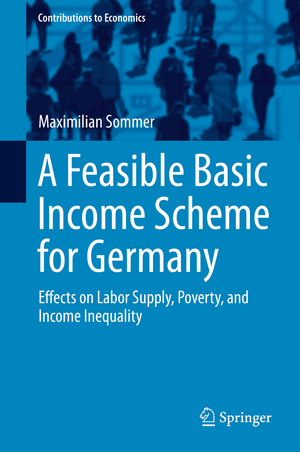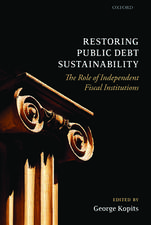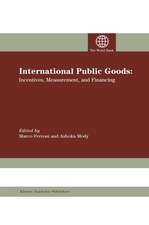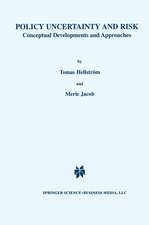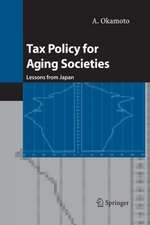A Feasible Basic Income Scheme for Germany: Effects on Labor Supply, Poverty, and Income Inequality: Contributions to Economics
Autor Maximilian Sommeren Limba Engleză Hardback – 10 mar 2016
| Toate formatele și edițiile | Preț | Express |
|---|---|---|
| Paperback (1) | 636.80 lei 6-8 săpt. | |
| Springer International Publishing – 19 apr 2018 | 636.80 lei 6-8 săpt. | |
| Hardback (1) | 643.00 lei 6-8 săpt. | |
| Springer International Publishing – 10 mar 2016 | 643.00 lei 6-8 săpt. |
Din seria Contributions to Economics
- 18%
 Preț: 1001.81 lei
Preț: 1001.81 lei -
 Preț: 90.83 lei
Preț: 90.83 lei - 15%
 Preț: 649.06 lei
Preț: 649.06 lei - 18%
 Preț: 1109.92 lei
Preț: 1109.92 lei - 24%
 Preț: 657.06 lei
Preț: 657.06 lei - 18%
 Preț: 976.54 lei
Preț: 976.54 lei - 17%
 Preț: 361.01 lei
Preț: 361.01 lei - 18%
 Preț: 1027.83 lei
Preț: 1027.83 lei -
 Preț: 283.93 lei
Preț: 283.93 lei - 15%
 Preț: 644.95 lei
Preț: 644.95 lei - 15%
 Preț: 638.24 lei
Preț: 638.24 lei -
 Preț: 394.29 lei
Preț: 394.29 lei - 15%
 Preț: 636.80 lei
Preț: 636.80 lei - 15%
 Preț: 637.78 lei
Preț: 637.78 lei - 18%
 Preț: 723.69 lei
Preț: 723.69 lei - 15%
 Preț: 635.47 lei
Preț: 635.47 lei - 15%
 Preț: 634.00 lei
Preț: 634.00 lei -
 Preț: 392.75 lei
Preț: 392.75 lei -
 Preț: 383.33 lei
Preț: 383.33 lei - 15%
 Preț: 637.28 lei
Preț: 637.28 lei - 15%
 Preț: 636.80 lei
Preț: 636.80 lei - 18%
 Preț: 950.96 lei
Preț: 950.96 lei - 15%
 Preț: 634.68 lei
Preț: 634.68 lei -
 Preț: 387.38 lei
Preț: 387.38 lei - 15%
 Preț: 647.27 lei
Preț: 647.27 lei - 15%
 Preț: 636.63 lei
Preț: 636.63 lei - 15%
 Preț: 639.73 lei
Preț: 639.73 lei -
 Preț: 385.62 lei
Preț: 385.62 lei - 15%
 Preț: 641.85 lei
Preț: 641.85 lei - 20%
 Preț: 649.60 lei
Preț: 649.60 lei - 15%
 Preț: 641.71 lei
Preț: 641.71 lei -
 Preț: 387.96 lei
Preț: 387.96 lei - 15%
 Preț: 645.47 lei
Preț: 645.47 lei -
 Preț: 385.08 lei
Preț: 385.08 lei - 15%
 Preț: 646.62 lei
Preț: 646.62 lei -
 Preț: 383.33 lei
Preț: 383.33 lei - 15%
 Preț: 638.43 lei
Preț: 638.43 lei -
 Preț: 381.21 lei
Preț: 381.21 lei - 15%
 Preț: 642.51 lei
Preț: 642.51 lei - 15%
 Preț: 637.78 lei
Preț: 637.78 lei - 15%
 Preț: 641.71 lei
Preț: 641.71 lei -
 Preț: 384.70 lei
Preț: 384.70 lei -
 Preț: 379.86 lei
Preț: 379.86 lei -
 Preț: 378.34 lei
Preț: 378.34 lei -
 Preț: 384.70 lei
Preț: 384.70 lei -
 Preț: 388.52 lei
Preț: 388.52 lei - 15%
 Preț: 641.71 lei
Preț: 641.71 lei -
 Preț: 381.00 lei
Preț: 381.00 lei - 15%
 Preț: 644.95 lei
Preț: 644.95 lei -
 Preț: 386.00 lei
Preț: 386.00 lei
Preț: 643.00 lei
Preț vechi: 756.47 lei
-15% Nou
Puncte Express: 965
Preț estimativ în valută:
123.05€ • 127.74$ • 102.61£
123.05€ • 127.74$ • 102.61£
Carte tipărită la comandă
Livrare economică 22 martie-05 aprilie
Preluare comenzi: 021 569.72.76
Specificații
ISBN-13: 9783319240626
ISBN-10: 3319240625
Pagini: 206
Ilustrații: XXI, 198 p. 31 illus. in color.
Dimensiuni: 155 x 235 x 14 mm
Greutate: 0.49 kg
Ediția:1st ed. 2016
Editura: Springer International Publishing
Colecția Springer
Seria Contributions to Economics
Locul publicării:Cham, Switzerland
ISBN-10: 3319240625
Pagini: 206
Ilustrații: XXI, 198 p. 31 illus. in color.
Dimensiuni: 155 x 235 x 14 mm
Greutate: 0.49 kg
Ediția:1st ed. 2016
Editura: Springer International Publishing
Colecția Springer
Seria Contributions to Economics
Locul publicării:Cham, Switzerland
Public țintă
ResearchCuprins
Introduction.- The Normative Argument for an Unconditional Basic Income.- Implementation of a Basic Income by a Negative Income Tax.- A Negative Income Tax Proposal for Germany.- Modeling Political Reforms: The Discrete Approach to Labor Supply.- Implications on the Proposed Basic Income Reform.
Textul de pe ultima copertă
This book analyzes the consequences that would arise if Germany’s means-tested unemployment benefits were replaced with an unconditional basic income. The basic income scheme introduced is based on a negative income tax and calibrated to be both financially feasible and compatible with current constitutional legislation. Using data from the German Socio-Economic Panel (GSOEP) the author examines the impact of the reform on the household labor supply as well as on both poverty and inequality measures. It is shown that by applying reasonable values for both the basic income and the implied marginal tax rate imposed on earned incomes, efficiency gains can be reconciled with generally accepted value statements. Furthermore, as the proposal includes a universal basic income for families, child poverty could be reduced considerably. The estimates are based on the discrete choice approach to labor supply.
Caracteristici
Proposes a concept for a feasible basic income scheme that completely reconciles socio-political and economic requirements Applies the latest microeconomics methods, concretely analyzing allocation and distribution effects on different household types Based on up-to-date empirical data Includes supplementary material: sn.pub/extras
